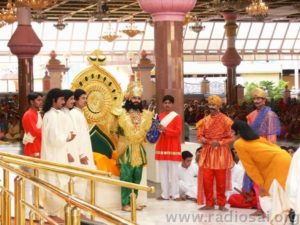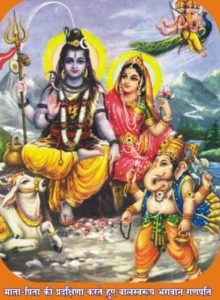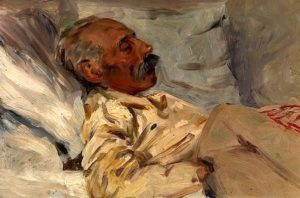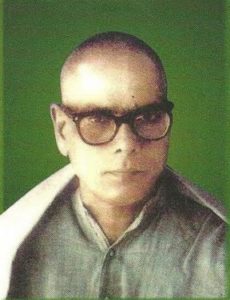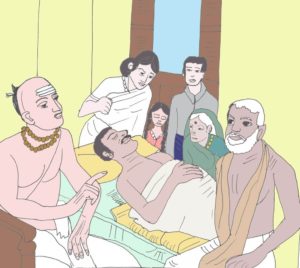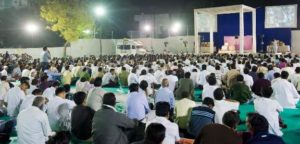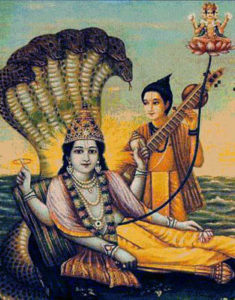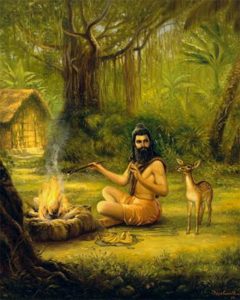The silent inconspicuous devotee
Central Theme: The last thing that we should be doing as human beings is judging the devotion to God in others. It is impossible to determine how devoted an individual is to God. Devotion is the sacred love that exists between an individual and God, and is known only to both of them. There is no yardstick available to human beings to measure devotion. Many of us consider external manifestations of devotion as a measure of one’s love for God: such as chanting the name of the Lord, spending time in worship, visiting places of worship or pilgrim centers, participating in holy gatherings, etc. However, these are neither necessary nor sufficient parameters for establishing the presence of devotion in an individual. In this short story, Bhagawan Baba breaks this myth and clarifies that devotion is a private matter between the devotee and the Lord and need not be known to anybody else.
The silent inconspicuous devotee-6.25-1998 April 22
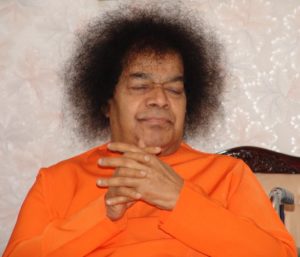 |
| Devotion is a personal relationship with God, not to be exhibited to others |
There are some people who are not known to be devotees to the outside world. They do not engage in any satsangh(holy association). They do not engage in any sacred conversation. They do not openly demonstrate any sacred action. But yet these set of people keep God hidden in their heart.
In a family there lived a husband and wife. The wife was an ardent devotee. She sanctified all her time in incessant remembrance of the name of the Lord. She kept looking forward to hearing the name of the Lord from her husband’s mouth any time or at any moment. But, the husband would not utter the name of the Lord in any situation or in any conversation. The wife was very depressed on account of this. God’s name is the most important principle for this life. God’s name is like the boat to cross the ocean of life. The wife was worried as to what would be the fate of her husband under these circumstances.
“Having been born as a human being, experiencing the noble life of a human being, what is the use of this life if he does not think about God? Is this my bad luck? Or is this his fortune?” The wife used to think about all this and cry to herself. One day she made a special prayer to the Lord. “O compassionate One, O ocean of mercy, why did You give such a mind to my husband? He is unable to remember You even for a moment. Whatever may be the circumstances, he never thinks about You. Why did You bestow on him such a hard heart. Why have you transformed my husband to a stone hearted person? And why have You given me alone so much devotion? There seems to be no relation between these two. Is this my fate? Is this my past karma?” Praying so, she cried a lot.
That night, the husband was fast asleep. While tossing to one side, he uttered, “Rama, Rama”. The wife heard these words. She told herself, “What a lucky day it is today. My ears are truly so lucky. I was able to hear the word “Rama” from the mouth of my husband”. Without his knowledge she got up from the bed. She decided to perform “poor feeding”, i.e. feeding food to the poor in the morning. She cleaned the house and decorated it with Rangoli (patterns created on the floor using materials such as coloured rice, dry flour, coloured sand or flower petals, meant to be sacred welcoming areas). She arranged for Managala Vaadya (Naadaswaram – auspicious music). When the husband got uup the Naadaswaram was playing at the entrance of the house. Banana plants were tied at the entrance of the house (symbolizing festivity and sacredness). The wife was jumping with joy and moving about in the house.
The husband asked her, “What is the festival today? Why are you so overjoyed?” When the husband questioned thus, she could not control herself anymore and she fell at the feet of her husband and cried out, “My God is an ocean of mercy, He is the storehouse of compassion. He has heard my prayers. Today I could get a reply for my prayers”. The husband asked her what reply was she referring to. The wife said, “Last night, in your sleep you remembered the name of Rama by chanting “Rama Rama”. In so many years I had never heard the name of Rama or Krishna or Govinda from your lips. At times I thought at least by mistake you may utter the name of the Lord while conversing with somebody. But I could not even hear that. However, yesterday night while tossing on the bed, you uttered the name of Rama. The name Rama uttered by you is the cause for my extreme joy. It has given me so much enthusiasm. Unable to control my joy I decided to offer free food to some ten or more people”.
Listening to this the husband was surprised. “What? Did the name of Rama escape from my lips? All this while, I protected Him so safely inside me. I kept His name locked inside my heart. Did He escape from my heart yesterday night?” So saying, the husband breathed his last!
Divine Discourse
22 April 1998
Will of God always prevails-Story of Shiva-Parvati and their house
Central Theme: God is omnipresent, omnipotent and omniscient. His Will always prevails. It is just that we, as human beings, with our restricted understanding and perspective and our limited conscious memory are unable to comprehend and recognize His Will pervading through every event in our lives. However, after the occurrence of an event or a situation, we find it easier to accept it as His Will. At times, our wish and desire may align with His Will, which brings us joy and happiness and at other times our plans may not be in alignment with His Will and such situations tend to make us feel disappointed and sometimes frustrated. However, Bhagawan Baba says that a true devotee must accept both such situations with a positive spirit and always remain cheerful knowing that whatever happen is for our good. In this short story, Bhagawan Baba uses examples of Lord Shiva (representing the Almighty Omniwill) and Parvati (representing Prakruti / Nature, i.e. the human being) to illustrate the above point.
Will of God always prevails-Story of Shiva-Parvati and their house-7.46-2000 May 16
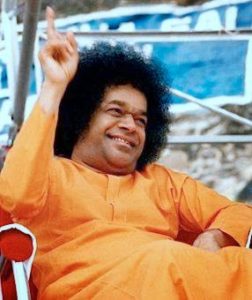 |
| God’s Will always prevails!! |
Here is a short story. Once upon a time, Parvati approached Lord Shiva and said, “You move around daily and hardly stay at one place any time. You move around everywhere but we do not have any home that we can call as our own. How can I lead such a life with you? There is no home, not even a shelter with a sheet. If it rains, we do not have any shelter with a sheet (roof). This apart, so many sages come to have your Darshan. If we build a small shed or a house, it would be convenient, both for us as well as for them.” Parvati prayed thus.
This goes to show that the house wife Parvati had a desire for a house. This is a very natural quality in all women. She asked for a house to be built. Iswara replied, “Parvati, what is there in building a house? Even before we enter into it, rats will get in. To prevent rats from coming in, we would need a cat. For the cat we would need milk. And then to take care of all this, we would need a maidservant. Why all this paraphernalia? It is better not to have any house at all”.
However, Parvati insisted on having a house and Iswara on not having one. This debate went on between them. In every family, this debate of “yes / no”, “yes / no”, keeps going on. Finally, the decision of Iswara prevailed. Parvati then very calmly put forth a question to Iswara, “Iswara why do you speak in such a stubborn manner? This (request for a house) is not merely for me. The sages too will come and reside here. They will stay here as there would be shelter for them. It would give you, me and everybody a shelter to cover ourselves”.
Iswara said, “Even if you were to start (building the house) now, the timing is not very good (auspicious). Whatever mansion you may build, Agni Devata (the Lord of fire) will burn the mansion out of anger. I am aware of the future. You do not know. Therefore, please remain silent and sit down”. Parvati replied, “Iswara, all powers are in you. All deities are in your control. Fire is under your control, In fact, all elements are under your control. If you command Agni (Lord of fire), he would not cause any harm, is it not? He would obey your command and would never violate it. Therefore, please command the Lord of fire”.
Iswara agreed to do so. What else could he do? The wish of the house lady had to be fulfilled. He made a promise to Parvati. He said, He would go to the Lord of fire and get a word of commitment from him. He asked her to wait till then. Since the words of Iswara are always the Truth, she started the construction of the house. But when Iswara was leaving, Parvati made one observation, “Iswara, in case Agni(the Lord of fire) comes and burns the house built by me, it will be a great embarrassment for me. Therefore, if Agni(Lord of fire) does not agree to your command, you please play the drum. Then, (understanding the signal) I will myself burn the house built by me. I will not give Agni (Lord of fire) this opportunity”. She got this promise from Iswara.
Iswara went to Agni (Lord of fire). Agni bowed to Him and asked, “Lord, what is the work for which you have come here? What is your command?” Iswara replied, “I have no wish. But, Parvati is building a house. She is likely to be harmed by you. But, I request you, not to get in her way. Kindly make me this promise”. Agni (Lord of fire) gave this promise. Having made the promise, Agniprayed to Iswara, “Swami, from so many days, I am desirous of seeing your Shiva Tandava dance. I have desired to witness the Shiva Tandava dance from such a long time”.
To satisfy Agni (Lord of fire), Shiva performed the Shiva Tandavadance. While performing the dance, Shiva played the drum (which is part of the performance). Parvati heard the sound of the drum and (mistaking it to be the signal from Iswara) she burned down the house built by her.
Tandava Kelisalpene Parameswarudu Sri Sambasivudu….(Telugu song describing Lord Shiva performing the Shiva Tandava dance)
Finally, Parvati burned down her house. Iswara came and saw this. The bonfire was on. Iswara asked, “Parvati, what is this strange happening? Lord Agni gave Me a word that he would not burn down the house.” Parvati in turn asked, “Then, why did you play the drum?” Iswara said, “In fact, I had willed (right from the beginning) that there should be no house. I performed the Shiva Tandava dance to satisfy Agni (Lord of fire). While performing the Tandava, I forgot and played the drum”.
This only means that the Will of Iswara will never go unfulfilled in spite of any obstacles coming in the way.
Divine Discourse
16 May 2000
Whatever happens is for our good-Story of King and Minister
Central Theme: To see any situation dispassionately and objectively, as is always desirable in understanding a scenario, it is essential to have a perception of the big picture. However, humans as we are, with limited knowledge of the past, thanks to our failing memories; total ignorance about the future and apathy towards the present; we hardly ever succeed in seeing the big picture or the helicopter view, if you wish. God, who is omnipresent, omniscient and omnipotent, is the only One who has a complete picture of each life in its entirety. Therefore, whatever God Wills, does or says with His Selfless Love must necessarily be for the ultimate good of human beings. However, when seen through the constrained lens of the human eye, His words or acts may appear negative or at times unjust. But all it takes is patience and forbearance to be a witness to how His Will unfolds itself in a way that we would never imagine and culminates in what is plausibly the best for us.
Whatever happens is for our good-Story of King and Minister-7.42-1995 August 25
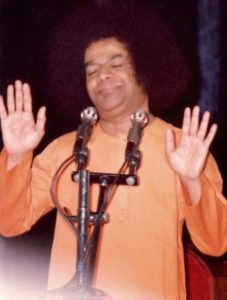 |
| Everything is for your good only… |
First of all we must make an attempt to recognize what God truly likes. What does God not like? Everything is within Him. But to redeem you, God acts as though He likes certain things. He says, “Son, do not talk too much. Do your work well. Think of God”. If all such things are told, is it told for Himself? Whatever God says or does, it is only for your sake. You must first of all recognize this truth. This is for my good. I have told you a number of times, “Whatever happens (you must think), it is for my good only”. I have told you this story:
Once upon a time, there used to be a king. As he was the king, several servants used to get sugarcane, peel the skin, cut it into small pieces and offer them to him. One day, the king desired to cut the sugarcane himself and eat it. He held the sugarcane and cut it with a knife. His finger got caught (in the process). The blood was oozing out. The Minister who stood next to the king, folded his hands and said, “Maharaja (king), this is good for you”. The king was furious, “What? My finger getting cut; is it good for me? Are you desirous of subjecting me to danger? Are you seeking that I should be subject to difficulties? Chee (fie on you)…such a Minister should not be with me”. The king called for a soldier and asked him to put the Minister in jail. Even while entering into the prison, the Minister said, “Maharaja (king), this is for my good”. Earlier he had told the king, “This is good for you”. Now he said, “This is good for me”.
The king was confused. My finger getting cut, the Minister said, was good for me. Now going to the jail, he says, is good for him. How can this be good? The king was drowned in this thought. These days, kings have crowns with all precious gems and stones on their head, but inside their head they have mud. This is so because; the kings always live with the support of others (seeking guidance from others). That is why they keep Ministers. The king then left the place.
After around three to four days, the king went to the forest for hunting. The king had no helper. The other soldiers do not generally sit in the king’s chariot. As the Minister was not there, the king was travelling in the chariot all alone. He went round and round and round the forest. He was tired. However, there was no one to even give him water. He sat and took rest under a tree.
Meanwhile, there were some tribals in the forest who were big thieves. They had a festival that day. What was the festival? It was the day when they had to offer a good human body as sacrifice to their family deity. They sent their soldiers all around to fetch some good human body. The soldiers were roaming all around the forest. The king was tired and relaxing below a tree. The thieves saw him. They thought, “Wow! We have got a very good person. He’s just like a sweet, a laddoo (sweet ball) for our deity”. Once they saw him, they caught him. They took him and proceeded to the king of the thieves. The king said, “Fine, we have got a good person. Make all arrangements for (the sacrifice) tomorrow”.
The king was fed well. They applied kumkum(vermillion) on his face. They tied neem leaves and took him to the Goddess, so as to behead him. There was a priest over there. He said, “There should be no defect in the offering that is being made to the God. Any human body with any sort of deformity cannot be offered to God. So please check whether all his limbs are fine”. They checked all parts of his body. They came close to the fingers. They found one finger cut. They exclaimed, “Che che che (fie)..Mother (Goddess) will not accept this body”. Saying so, they left him free.
The king immediately thought about the statement made by the Minister. He had said (with respect to the cut finger), “It is good for you”. He thought, “Today because my finger was cut, my life got saved”. He believed that what the Minister had said was the greatest truth. But the Minister had said (with respect to him going to jail) that it was good for him. How can being in the jail be good for him?”
The king went straight from the forest to the jail. He said, “Minister, what you said has become true. It is the highest truth. My finger getting cut was good for me. The Goddess did not accept me and therefore I was set free with my life. But when you were sent to jail, you said, that was good for you. What is good for you in this?” The Minister replied, “Maharaja (king), in case I was fine and I would not have been in jail, I would have come along with you. Your body had a defect but my body would have been fine. Therefore, they would have offered me as a sacrifice. That is why; putting me in the jail was good for me. My life also got saved. It is good for you as your life also got saved”.
Thus whatever happens, (we must think), it is good for me, good for me, good for me. Only when we recognize this truth, we will earn God’s Grace in plenty, in abundance. If we go only by our own feelings, when will we follow the vast, lofty principle of God? We must have the firm confidence that whatever God says or does, it is for my good.
Divine Discourse
25 August 1995
The husband and his four wives with varied expectations
Central Theme: Human temperaments vary from person to person. Accordingly, the approach followed to develop an intimate relationship with God, also varies from person to person. Some consider God as a supreme being whose duty is to solve their problems and difficulties and bring happiness to them. Others regard God as a “Cosmic ATM” who ought to bestow all riches and wealth on them. There are others who seek for the highest wisdom and wish to know the Truth about the creation and the creator. And then there are those who have no desires but to seek Him. Lord Krishna in the Bhagavad Gita, declares that all these four types of devotees are very dear to Him.
Chatur-Vidha Bhajante Maam
Janah Sukrtino ‘rjuna
Arto Jijnasur Artharthi
Jnani Cha Bharatarsabha
O best among the Bharatas [Arjuna], four kinds of pious men render devotional service unto Me: the distressed, the desirer of wealth, the inquisitive, and he who is searching for knowledge of the Absolute.
Bhagavad Gita, Chapter-7, Sloka 16
Bhagawan Baba illustrates this concept of the four types of devotees, through the story of a rich man who had four wives, with varying expectations from their husband.
The husband and his four wives with varied expectations-7.11-1996 December 25
 |
| All four types of devotees are dear to the Lord |
Whatever changes may take place we must never forget the fundamental principle. After birth we call the person as a child. After ten years, we refer to him as a boy. After thirty years, we call him a man and after 75 years we address him as grandfather. The person is one, but the difference is in age and in names. That is the fundamental principle. There is only person and he is only the child, the boy, the man and the grandfather.
In the same manner, God in the beginning assumes a form. When we face difficulties and problems we pray to Him as Aarthis. Later we assume the role of Arthaarthis. Then we become Jignaasis. In this manner we must develop different types of intimate bonding and relationship with God.
Here is a short story. A rich man had four wives. The first wife was very spiritual. The second wife was not keeping very well due to ill health. The third wife used to read many good books. The fourth wife was a modern wife. She desired for fashionable saris, fashionable jewels and such other fashionable items. Once, the rich man had to go to America on some business work. However, the work for which he had gone could not be completed in time and he kept postponing his return. He then wrote four letters, one to each of his wives. He wrote, “I am returning in the coming week. Each one you, please send me a message about what all you want from here. Send me a fax message”.
The fourth wife, who was a modern girl, wrote to him, “In that country, whatever latest fashion saris and jewels are there, please bring them for me”. The third wife asked him to bring books on the stories of great and noble characters. The second wife wrote, “I am unable to bear my sickness. If there are any latest medicines for this ailment, please bring them to me”. The first wife wrote, “I do not need anything. You please return here safely, that is enough for me”.
The husband returned. He gave the saris and jewels that he had brought, to the fourth wife. He gave to the third wife the books that he had brought with him. To the second wife, he handed over the medicines that he had brought. He then went to the first wife and stayed with her in his house. The other three wives got angry. “Why do you stay there? Why don’t you come here?”’ they questioned. It is so difficult in this world to stay with one wife itself; and if there are two wives, nothing more to say! And if one has three wives, then one would have to go on exile like Sri Rama had to (when one of the three wives prayed to King Dasaratha accordingly). And with four wives, it would be just unbearable.
The three wives therefore started fighting with him. He then said (pointing to the three wives), “I gave you what you desired. You asked for saris and jewels. You asked for good books. You wanted medicines. And she (pointing to the first wife) desired for me. Therefore, I am staying with her”.
God is also just like that. To those who pray for riches and wealth, God confers on them riches and wealth. To others who pray for wisdom, He grants them wisdom. To those who pray for healing their sickness, He gives them medicines by constructing super speciality hospitals. And to those who pray only for Him, He goes and stays close to them. These are the four types of devotees: Aarthi, Arthaarthi, Jignaasuand Jnani.
Therefore whatever we desire, God will grant us the same. But these are all not important for us. It is God who is important. Once God becomes ours, we can earn whatever we want. Thus, real wealth is God. Real health is God. Humans should make an attempt to desire for such God. Why? Because, we have come from God, we need to reach back to Him.
Note: A brief explanation about the four types of devotees:
Arthi is the distressed devotee who suffers and craves for the grace of God in order to be relieved from pain and sorrow. He worships in order to receive God’s grace and be relieved from suffering on account of disaster, failure, loss, harassment, etc.
Artharthi is the seeker of wealth who worships the Lord in order to acquire material possessions, progeny, assets, property, fame and fortune.
Jignasu is the enquirer and intellectual devotee. He is dissatisfied with the world and feels there is a void in his life. He senses that pleasure is not the highest form of happiness and that there is pure eternal bliss to be found within, untainted by grief and pain. He seeks higher knowledge and wisdom.
Jnani is a man of knowledge who has attained self-illumination. He is the wise bhakta who seeks God without any expectations and realizes that the Lord is within himself and everywhere around him.
Divine Discourse
25 December 1996
Assembly of Scholars or Congregation of Cobblers




